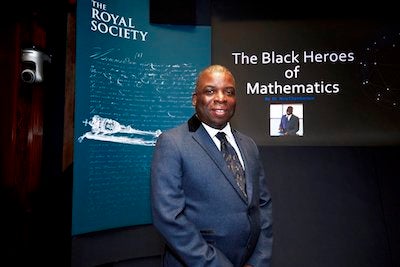This article was published in Scientific American’s former blog network and reflects the views of the author, not necessarily those of Scientific American
On this episode of our podcast My Favorite Theorem, my cohost Kevin Knudson and I were happy to talk with Nira Chamberlain. You can listen to the episode here or at kpknudson.com, where there is also a transcript.

Dr. Nira Chamberlain. Credit: Nira Chamberlain
On supporting science journalism
If you're enjoying this article, consider supporting our award-winning journalism by subscribing. By purchasing a subscription you are helping to ensure the future of impactful stories about the discoveries and ideas shaping our world today.
Dr. Chamberlain is an applied mathematician and President Designate of the Institute of Mathematics and its Applications in the UK. Last summer he was officially declared the World’s Most Interesting Mathematician in the Big Internet Math-Off hosted by Christian Lawson-Perfect at the Aperiodical. He chose to talk about the Lorenz equations, a mathematical system originally developed by Edward Lorenz to model the atmosphere and therefore the weather.
Although the equations were fairly simple, Lorenz discovered that tiny changes in the inputs led to drastically different outputs. The Lorenz system is one of the most popular examples of chaotic behavior. (Longtime podcast listeners may remember that Jana Rodriguez Hertz also told us about a chaotic system in her episode of the podcast.) Lorenz's work led to the coining of the term “butterfly effect”: something as gentle as the flap of a butterfly's wings could cause a hurricane on the other side of the world. For more information on the Lorenz system, click here.
The Lorenz attractor, one example of which is pictured at the top of this post, shows what this chaotic behavior looks like. The term attractor means it is a path to which particles in the system are pulled. But its complicated shape shows the system's chaotic behavior. Points traveling along the curve cross from one side to the other abruptly, and points that start at nearby locations in space may end up at very different places along the curve relatively quickly. For an interactive Lorenz attractor, complete with butterflies, see this page by Malin Christersson. For some beautiful images of Lorenz attractors, check out this page by Paul Bourke.
The weather being such an interesting topic, we spent a lot of the podcast talking about it. The fact that the weather is a chaotic system means there isn’t much hope for increasing the accuracy of weather forecasts more than a few days out. Different weather models can sometimes have very different predictions. Dr. Chamberlain mentioned a 1987 storm that hit parts of the UK and northern France. The French model had predicted it but the British model had not. You can read more about the Great Storm of 1987 here.
In each episode of the podcast, we ask our guest to pair their theorem with something. Dr. Chamberlain, whose parents are Jamaican, chose ackee yam and saltfish, a Jamaican dish, as the perfect accompaniment to the Lorenz equations. (If, like Kevin and me, you haven’t heard of ackee before, it’s a tropical and subtropical fruit with a consistency similar to scrambled eggs.) You’ll have to listen to the podcast to learn why they make such a good pair.
You can find Dr. Chamberlain on his website and Twitter. You can find more information about the mathematicians and theorems featured in this podcast, along with other delightful mathematical treats, at kpknudson.com and here at Roots of Unity. A transcript is available here. You can subscribe to and review the podcast on iTunes and other podcast delivery systems. We love to hear from our listeners, so please drop us a line at myfavoritetheorem@gmail.com. Kevin Knudson’s handle on Twitter is @niveknosdunk, and mine is @evelynjlamb. The show itself also has a Twitter feed: @myfavethm and a Facebook page. Join us next time to learn another fascinating piece of mathematics.
Previously on My Favorite Theorem:
Episode 0: Your hosts' favorite theorems Episode 1: Amie Wilkinson’s favorite theorem Episode 2: Dave Richeson's favorite theorem Episode 3: Emille Davie Lawrence's favorite theorem Episode 4: Jordan Ellenberg's favorite theorem Episode 5: Dusa McDuff's favorite theorem Episode 6: Eriko Hironaka's favorite theorem Episode 7: Henry Fowler's favorite theorem Episode 8: Justin Curry's favorite theorem Episode 9: Ami Radunskaya's favorite theorem Episode 10: Mohamed Omar's favorite theorem Episode 11: Jeanne Clelland's favorite theorem Episode 12: Candice Price's favorite theorem Episode 13: Patrick Honner's favorite theorem Episode 14: Laura Taalman's favorite theorem Episode 15: Federico Ardila's favorite theorem Episode 16: Jayadev Athreya's favorite theorem Episode 17: Nalini Joshi's favorite theorem Episode 18: John Urschel's favorite theorem Episode 19: Emily Riehl's favorite theorem Episode 20: Francis Su's favorite theorem Episode 21: Jana Rordiguez Hertz's favorite theorem Episode 22: Ken Ribet's favorite theorem Episode 23: Ingrid Daubechies's favorite theorem Episode 24: Vidit Nanda's favorite theorem Episode 25: Holly Krieger's favorite theorem Episode 26: Erika Camacho's favorite theorem Episode 27: James Tanton's favorite theorem Episode 28: Chawne Kimber's favorite theorem Episode 29: Mike Lawler's favorite theorem Episode 30: Katie Steckles' favorite theorem Episode 31: Yen Duong's favorite theorem Episode 32: Anil Venkatesh's favorite theorem Episode 33: Michèle Audin's favorite theorem Episode 34: Skip Garibaldi's Favorite Theorem
